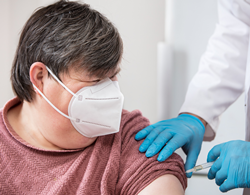
According to a recent study, people with IDD are more likely to contract COVID-19 and be hospitalized. They are less likely to receive ICU-level care yet are more likely to die from the disease.
Inadequate pay, stressful working conditions, and workplace closures all contribute to support staff shortages. Fewer staff means the chances of noticing signs that point to deteriorating health will drop dramatically.
CLEARWATER, Fla. (PRWEB)
November 15, 2021
Despite vaccination efforts, it’s clear that complete eradication of the virus isn’t possible for the time being. The impacts to society have been profound, and the American healthcare workforce has been among the hardest hit. For people with intellectual and developmental disabilities (IDD), that has resulted in a critical shortage of support staff who provide them essential services and assist with daily activities that help improve quality of life. Dr. Craig Escudé, President of IntellectAbility, which provides health risk screening and training resources for people who support individuals with IDD, says, “It’s a multifaceted problem, and it’s one we need to solve. Inadequate pay, stressful working conditions, and workplace closures all contribute to support staff shortages. Fewer staff means the chances of noticing signs that point to deteriorating health will drop dramatically. If we don’t fix this, people with IDD will remain exceptionally vulnerable to COVID-19 and other debilitating conditions.”
People with IDD already have generally poorer health outcomes compared to people who don’t. Many people with IDD also have serious comorbidities, such as cardiovascular disease, respiratory problems, and diabetes. According to a recent study, people with IDD are more likely to contract COVID-19 and be hospitalized. They are less likely to receive ICU-level care yet are more likely to die from the disease.(1)
The lack of direct support professionals (DSP) for people with IDD is already causing significant problems. In some areas of the country, the system of agencies and organizations supporting people with IDD has begun to collapse.(2) Many organizations have closed their doors or cut back on services for people with IDD. Many have begun to turn away those needing direct support services because there simply aren’t enough DSPs to help.
ANCOR Report Highlights Shocking Workforce Statistics
A recent report from the American Network of Community Options and Resources (ANCOR) examined the factors behind the DSP shortage. Data collected from respondents showed four key staffing trends among America’s direct support workforce:(3)
- 92.5% of respondents said other industries that previously paid comparable wages now pay more, making them more attractive employers.
- 86.2% said that DSP wages were lower than unemployment income or other state or federal safety net benefits.
- 47.7% said that DSPs who left their profession temporarily due to the pandemic haven’t returned to work.
- 18.6% said that DSPs who left day programs in favor of residential settings now prefer to remain in those positions.
As a result, there are significantly less people helping people with IDD on a daily basis. And unfortunately for those who remain, many don’t receive proper training to work with this population. As a result, those DSPs are less likely to recognize subtle changes or nonverbal signs of illness or distress in a person with IDD.
CDC Toolkit Designed to Help Patients and Providers
To help combat this issue, the Centers for Disease Control and Prevention (CDC) launched a new toolkit for DSPs and people with IDD. The toolkit deals directly with COVID-19—it helps DSPs more easily communicate with people with IDD about COVID-19 and provides valuable information on hand washing, getting vaccinated or tested, social distancing, and masks. Depending on the person’s individual needs, elements of the toolkit may be presented as a social story, video, or poster to help share information and reinforce concepts.
Dr. Escudé and other clinicians view the toolkit as an essential factor in the fight against COVID-19, especially in times where there is a shortage of trained DSPs who may have challenges in communicating with people with IDD. IntellectAbility also advocates for people with IDD by offering tools and resources to help train DSPs. These resources provide efficient ways to impart health risk prevention and person-centered training to supporters. Most DSPs receive little to no training in person-centered support for those with IDD. Instead, they perform their job duties without always including people with IDD in their own care plans and routines.
Dr. Escudé says, “Better training leads to better support for people with IDD. COVID-19 isn’t going anywhere, and we must take steps to help DSPs receive the training and support they need to make them want to stay in their jobs. This will help one of our most vulnerable patient populations as we all settle in for the long haul with this pandemic.”
About IntellectAbility:
IntellectAbility provides tools and training to agencies, governmental entities and supporters of people with intellectual and developmental disabilities to foster early recognition and mitigation of health risks thereby improving health and wellness. One such tool is the Health Risk Screening Tool (HRST), of which they are the sole developer, producer, and distributor. The web based HRST is the most widely used and validated health risk screening instrument for people with intellectual and developmental disabilities. IntellectAbility also provides numerous health-related and person-centered service trainings for supporters of people with IDD. With unrelenting focus, IntellectAbility works to fulfill its mission of improving health and quality of life for people with intellectual and developmental disabilities and other vulnerabilities. For more information, visit ReplacingRisk.com.
Sources
1. Jonathan Gleason, MD, et al. “The Devastating Impact of Covid-19 on Individuals with Intellectual Disabilities in the United States.” NEJM Catalyst Innovations in Care Delivery, catalyst.nejm.org/doi/full/10.1056/CAT.21.0051#:~.
2. Giammarise, Kate. “’We’re Beginning to See the Collapse of the System’: Agencies That Serve People with Disabilities Call for More Funds to Pay Staff.” 90.5 WESA, 7 Oct. 2021, wesa.fm/politics-government/2021-10-07/were-beginning-to-see-the-collapse-of-the-system-agencies-that-serve-people-with-disabilities-call-for-more-funds-to-pay-staff.
3. American Network of Community Options and Resources PDF; “The State of America’s Direct Support”; Accessed 09 Nov 2021; ancor.org/sites/default/files/the_state_of_americas_direct_support_workforce_crisis_2021.pdf
Share article on social media or email:

